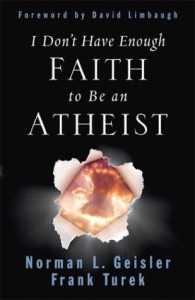Critiquing "I Don't Have Enough Faith to Be an Atheist" (Ch.1, p.35-39)
Sorry I'm late with this one. The wife fell ill this week and the new employee needed training. Wah, wah, wah. Onwards.
With Chapters 1 and 2 (they are grouped together in the book, so we'll do it too), Messrs. Geisler and Turek seek to prove, as you might expect, the first two points of their case for the Bible. In keeping with their intention to prove the inerrancy of the Bible "from the ground up" - taking no link in the chain of their argument for granted - these first points are pretty basic:
Truth about reality is knowable.
The opposite of true is false.
For purposes of clarity, I'm dividing their first point into two sub-points (both of which they address):
1.1. Truths about reality exist.
1.2. Truths about reality are knowable.
The first point of these two sub-points and the second point are easily and ably proven through logic. Since all truths exclude their opposites, they can't all be true; most of them have to be false. Easy. So let's just check those right off by bolding them, like Geisler and Turek do in their book:
1.1. Truths about reality exist.
1.2. Truths about reality are knowable.
2. The opposite of true is false.
Now: in my opinion, the first thin ice upon which Geisler and Turek walk concerns Point 1.2.
The doctors declare that truths about our reality can be induced and deduced through information we obtain via our five senses and some good logic - and as easily agreeable as that sounds, many a philosopher would disagree. A school of thought exists which suggests we can never be certain of anything, because our five senses are easily fooled and our ability to analyze anything logically depends on our senses.
My maternal grandmother is a perfect example of what these philosophers mean. To my family's general horror, my grandmother's mind has disintegrated over the last several years; she is now "demented" in the medical sense of the word, as well as a victim of Alzheimer's. As a result, I have entered her home to find her hiding in her house from intruders she can clearly see, but we can't; had to stop her from going into the forest to look for her lost children (my parents); and watched helplessly as she spoke with her reflection in her bedroom mirror. I've never witnessed anything more heartbreaking or disturbing.
I can compare my grandmother to other people and see that yes, she must be the one who's crazy. All evidence points to her view of reality being mistaken, not mine. But try telling my grandmother that.
I certainly have. To my regret I occasionally became frustrated with her - mad because as many times as I told her my aunt is not her sister or some other rudimentary fact about the world, she did not absorb that information - but now I've come to accept she can't will her way out of her current perspective. Her way of looking at the world is as unshakable as mine is now... which apparently isn't that unshakable at all. All it would take to change it is a good, hard hit to the head or a neurological disorder.
So what if you were afflicted with my grandmother's disorders? Yes, you'd be insane - but how could you tell? And how, some philosophers add, can we tell that we're not already afflicted with "disorders" of our own? We can't, of course. And thus the truth may be out there, but we can't know it for sure. Geisler & Turek name this viewpoint ornery agnosticism*.
Or so many of us might think, say Drs. Geisler & Turek, before reading I Don't Have Enough Faith to Be an Atheist - because they claim to have coined a method by which you - yes, you! - can easily demonstrate the absurdity of such notions. And if you think I'm merely mocking the good doctors with my enthusiasm, well, here's their introduction of it:
If someone said to you "I have one insight for you that will absolutely revolutionize your ability to quickly and clearly identify the false statements and false philosophies that permeate our culture," would you be interested? That's what we're about to do here. In fact, if we had to pick just one thinking ability as the most valuable we've learned in our many years of seminary and postgraduate education, it would be this: how to identify and refute self-defeating statements... (38)
They call it... the Road Runner Tactic.
And it is certainly as simple as advertised: you're supposed to identify a self-defeating statement (if I write "I can't write a word in English" I am clearly wrong) and then turn it back on its itself ("Ah ha!" you might wittily reply, "That can't be true, because you just wrote that in English!"), thus revealing it as the nonsense. Simple as it is, though, Geisler and Turek assure us:
This will make you look like a super genius!
And as is their wont, they offer us a few anecdotes to show us how well it's worked for them.
Which we'll judge for ourselves on Wednesday.
*I just tried to google "ornery agnosticism", since it struck me as an odd label, and can't find it referenced outside of Christian apologetics.

